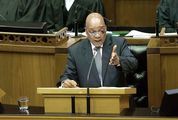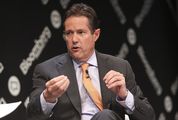Election funding opens door for hijacking of democracy
by Michael Marchant,
2016-02-23 05:48:52.0
THE municipal elections this year are likely to be the most expensive local polls yet. Political parties are seeking more and more money to finance electoral campaigns, increasing the need to attract private funders. This opens up the space for the capture of politics by narrow private interests, a hot topic when it comes to national politics but one that is strangely absent from our discussions of local government and the upcoming elections.
Traditional and social media are awash with renewed debate about the relationship between President Jacob Zuma and the Gupta family. Amid these discussions there has been much anger. The Economic Freedom Fighters (EFF) has gone as far as threatening to drive the family out of the country. The anger stems from the idea that certain leaders and state institutions have been captured by wealthy private interests, and that these interests drive policy and decision-making, rather than the interests of the citizens.
The African National Congress (ANC) itself has referred to it as a potential threat to democracy, with general secretary Gwede Mantashe speaking to the risks of the "capture" of ANC leaders by business interests. This goes to the heart of concerns about the influence of money in politics.
The almost inevitable focus on national politics and decision-making obscures similar dynamics at a local level.
A leaked letter has revealed a brazen attempt by Beaufort West mayor Truman Prince to obtain funds for campaigning in the upcoming local government elections, in exchange for favouring "sympathetic construction companies" in the awarding of local construction contracts.
Cases like this force us to expand the debate on party funding to examine the effect of secret funding on local government. It is in this sphere that the nexus between business and government is having a significant impact on people’s experience of democracy.
SA has no regulations or reporting requirements for private funding of political parties. A recent Constitutional Court challenge by My Vote Counts has reignited an important debate on whether this funding should be allowed to remain secret. The majority of the court ruled last year that My Vote Counts needed to take a different legal route to take on this issue, focusing essentially on a technicality.
The minority submission, however, made a very strong case for the fact that secrecy in party funding is unconstitutional because it infringes on citizens’s right to vote. The argument is that since we know political parties respond to the interests of donors, if we cannot have access to who those donors are we do not have the information necessary to make an informed choice at the ballot box. The added scandals around Hitachi and ANC front Chancellor House have added to the concern that private interests can buy influence with the government, marginalising and disempowering voters.
These discussions have tended to ignore how these issues play out in the local government sphere.
It is partly indicative of a broader bias in our political debates. It is also a result of our reliance on investigative journalism, which is generally underresourced and tends to focus on more urban and national stories, to reveal scandals about party funding. It is a pity, for secret party funding at a local government level has similar potential to undermine democracy.
The local government has the constitutional mandate to deliver services to communities, and to contribute to development and socioeconomic progress. To fulfil this crucial responsibility local government very often employs private companies to provide goods and services. The sums of money up for grabs are significant. In the first half of the 2014-15 financial year municipalities spent R142.6bn, of which R123bn went to procurement for daily operations (not capital expenditure). This provides obvious space for corruption and the exchange of favours, which the business community should be increasingly concerned about.
Prince requested that construction companies "sympathetic" to the ANC be granted the tender so that they would be in a position to fund the ANC’s campaign in the upcoming elections for Beaufort West. It is worth remembering that R11m was funnelled from two sector education and training authorities (Setas) to a community trust founded by Higher Education and Training Minister Blade Nzimande, who has ministerial authority over the Setas, last year. As national institutions are weakened in this manner, it becomes easier for a range of actors to co-opt them for private or party purposes.
Many local government officials do not need to go to the length of trying to manipulate a national tender process or other institutions. Democratic SA has moved towards a highly decentralised system of procurement, where local officials have significant leeway to directly select the private companies they employ. This opens up thousands of political economies (in the words of the Public Affairs Research Institute) where local officials can extract money for themselves and to fund electoral campaigns, in exchange for favouring certain companies in local tenders. Given the lack of resources for community media and investigative journalism, it is likely that many of these cases are not discovered.
When relationships between local government and business becomes about the exchange of tenders for party funding, it is clear that the constitutional mandate of local government is compromised. Service delivery often suffers, with severe social consequences. This in itself is damaging to the democratic project.
With each new scandal, citizens’s trust in elected officials, political parties and other institutions of state erodes. People grow increasingly sceptical of whether this democracy can work for the people.
We must require of all levels of political parties to publicly disclose their sources of private funding. From the role of the Guptas in the nuclear deal, to a skills development centre in Beaufort West, corrupt deals so often include political party funding as a trade-off. As election campaigning grows more and more expensive, this problem will only grow.
We should see it as a problem applying to all political parties. We would be foolish to believe any politician who claims their private funds come with "no strings attached" (as the Democratic Alliance’s Helen Zille claimed in a tweet last year).
The upcoming elections offer civil society the opportunity to pressure parties to commit to reform on party funding, and to put this issue on the political agenda. More than 20 years into our democracy, the corrosive influence of money in politics seems to be at its height. We must address it now if we hope to change the system that entrenches political inequality in favour of the wealthy and well connected.
• Marchant is a research associate at the Open Secrets project, linked to the Institute for Justice and Reconciliation

Picture: THINKSTOCK
THE municipal elections this year are likely to be the most expensive local polls yet. Political parties are seeking more and more money to finance electoral campaigns, increasing the need to attract private funders. This opens up the space for the capture of politics by narrow private interests, a hot topic when it comes to national politics but one that is strangely absent from our discussions of local government and the upcoming elections.
Traditional and social media are awash with renewed debate about the relationship between President Jacob Zuma and the Gupta family. Amid these discussions there has been much anger. The Economic Freedom Fighters (EFF) has gone as far as threatening to drive the family out of the country. The anger stems from the idea that certain leaders and state institutions have been captured by wealthy private interests, and that these interests drive policy and decision-making, rather than the interests of the citizens.
The African National Congress (ANC) itself has referred to it as a potential threat to democracy, with general secretary Gwede Mantashe speaking to the risks of the "capture" of ANC leaders by business interests. This goes to the heart of concerns about the influence of money in politics.
The almost inevitable focus on national politics and decision-making obscures similar dynamics at a local level.
A leaked letter has revealed a brazen attempt by Beaufort West mayor Truman Prince to obtain funds for campaigning in the upcoming local government elections, in exchange for favouring "sympathetic construction companies" in the awarding of local construction contracts.
Cases like this force us to expand the debate on party funding to examine the effect of secret funding on local government. It is in this sphere that the nexus between business and government is having a significant impact on people’s experience of democracy.
SA has no regulations or reporting requirements for private funding of political parties. A recent Constitutional Court challenge by My Vote Counts has reignited an important debate on whether this funding should be allowed to remain secret. The majority of the court ruled last year that My Vote Counts needed to take a different legal route to take on this issue, focusing essentially on a technicality.
The minority submission, however, made a very strong case for the fact that secrecy in party funding is unconstitutional because it infringes on citizens’s right to vote. The argument is that since we know political parties respond to the interests of donors, if we cannot have access to who those donors are we do not have the information necessary to make an informed choice at the ballot box. The added scandals around Hitachi and ANC front Chancellor House have added to the concern that private interests can buy influence with the government, marginalising and disempowering voters.
These discussions have tended to ignore how these issues play out in the local government sphere.
It is partly indicative of a broader bias in our political debates. It is also a result of our reliance on investigative journalism, which is generally underresourced and tends to focus on more urban and national stories, to reveal scandals about party funding. It is a pity, for secret party funding at a local government level has similar potential to undermine democracy.
The local government has the constitutional mandate to deliver services to communities, and to contribute to development and socioeconomic progress. To fulfil this crucial responsibility local government very often employs private companies to provide goods and services. The sums of money up for grabs are significant. In the first half of the 2014-15 financial year municipalities spent R142.6bn, of which R123bn went to procurement for daily operations (not capital expenditure). This provides obvious space for corruption and the exchange of favours, which the business community should be increasingly concerned about.
Prince requested that construction companies "sympathetic" to the ANC be granted the tender so that they would be in a position to fund the ANC’s campaign in the upcoming elections for Beaufort West. It is worth remembering that R11m was funnelled from two sector education and training authorities (Setas) to a community trust founded by Higher Education and Training Minister Blade Nzimande, who has ministerial authority over the Setas, last year. As national institutions are weakened in this manner, it becomes easier for a range of actors to co-opt them for private or party purposes.
Many local government officials do not need to go to the length of trying to manipulate a national tender process or other institutions. Democratic SA has moved towards a highly decentralised system of procurement, where local officials have significant leeway to directly select the private companies they employ. This opens up thousands of political economies (in the words of the Public Affairs Research Institute) where local officials can extract money for themselves and to fund electoral campaigns, in exchange for favouring certain companies in local tenders. Given the lack of resources for community media and investigative journalism, it is likely that many of these cases are not discovered.
When relationships between local government and business becomes about the exchange of tenders for party funding, it is clear that the constitutional mandate of local government is compromised. Service delivery often suffers, with severe social consequences. This in itself is damaging to the democratic project.
With each new scandal, citizens’s trust in elected officials, political parties and other institutions of state erodes. People grow increasingly sceptical of whether this democracy can work for the people.
We must require of all levels of political parties to publicly disclose their sources of private funding. From the role of the Guptas in the nuclear deal, to a skills development centre in Beaufort West, corrupt deals so often include political party funding as a trade-off. As election campaigning grows more and more expensive, this problem will only grow.
We should see it as a problem applying to all political parties. We would be foolish to believe any politician who claims their private funds come with "no strings attached" (as the Democratic Alliance’s Helen Zille claimed in a tweet last year).
The upcoming elections offer civil society the opportunity to pressure parties to commit to reform on party funding, and to put this issue on the political agenda. More than 20 years into our democracy, the corrosive influence of money in politics seems to be at its height. We must address it now if we hope to change the system that entrenches political inequality in favour of the wealthy and well connected.
• Marchant is a research associate at the Open Secrets project, linked to the Institute for Justice and Reconciliation



























Change: 0.79%
Change: 0.68%
Change: 1.29%
Change: 0.34%
Change: 1.65%
Data supplied by Profile Data
Change: 1.38%
Change: -0.34%
Change: 0.79%
Change: 0.00%
Change: -0.19%
Data supplied by Profile Data
Change: 3.71%
Change: 3.12%
Change: 3.05%
Change: 2.91%
Change: 2.30%
Data supplied by Profile Data
Change: -0.05%
Change: -1.30%
Change: -0.14%
Change: 0.21%
Change: 0.14%
Data supplied by Profile Data